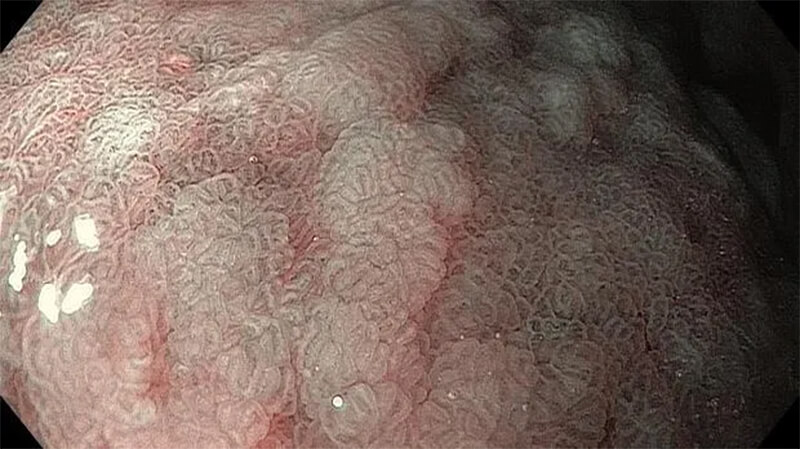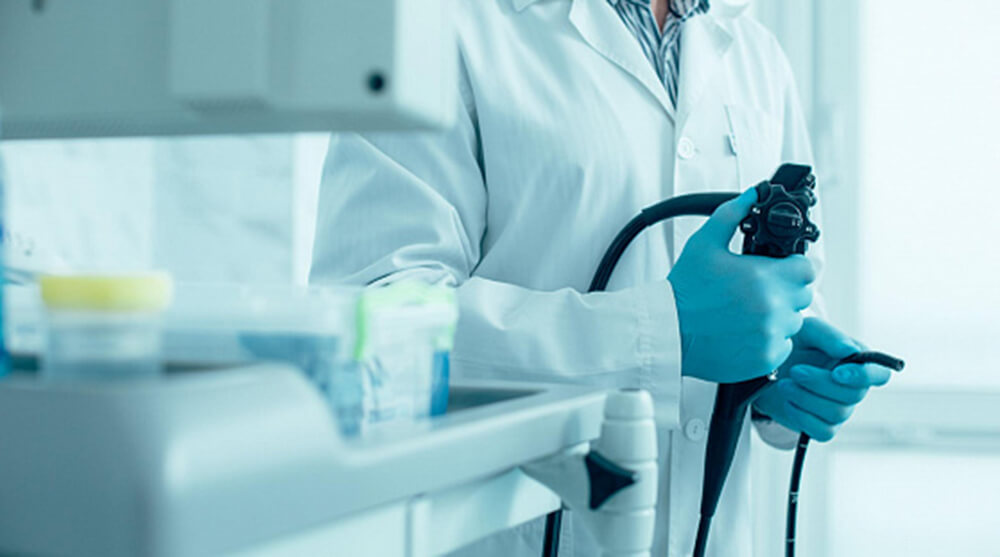Calls for Ukraine
Calls for Europe
Calls for USA

Intestinal metaplasia of the stomach is an abnormal condition, the characteristic feature of which is the replacement of cells of the gastric mucosa with cells similar in structure to the epithelial cells of the small or large intestine. In this case, goblet cells, Paneth cells, and cells with a brush border can be found in the epithelium of the stomach; specific substances that are not typical for this zone of the digestive system begin to be produced. Similar changes are often found in patients with chronic gastritis, namely atrophic gastritis.
Metaplasia itself is not considered an independent disease. However, this is a rather serious sign, which indicates quite alarming structural changes in tissues. When cells characteristic of this condition appear in the mucous membrane, the functioning of the digestive system noticeably deteriorates. This can lead to the fact that a person ceases to receive the required amount of important nutrients, and this in turn leads to various disorders and health problems. Metaplasia is considered a pathology that can be corrected. However, if its symptoms are ignored, tissue dysplasia develops, which with a high degree of probability degenerates into cancer.
Would you like a free consultation?
To choose the best doctor and sign up for a consultation at the clinic, leave a request on the MedTour website. The medical coordinator will help you choose a doctor and select the best clinic, taking into account your wishes.
Free consultation
Often this condition remains undiagnosed, so it is difficult to determine the exact frequency of its occurrence and determine the reliable rate of degeneration of cells into cancer. However, the correlation of characteristic metaplastic changes in the epithelium with the occurrence of gastric cancer has been unambiguously identified.
According to statistics, 10-20% of people with intestinal metaplasia will eventually be diagnosed with cancer. It is generally accepted that, on average, this condition progresses to malignancy within several years. These figures are sufficient reason to take disorders in the digestive system seriously, and if intestinal metaplasia of the stomach is detected, it is necessary to undergo timely treatment.
The Medtour platform will help you choose a clinic and doctor who can provide qualified assistance and select the optimal treatment.
Would you like a free consultation?
To choose the best doctor and sign up for a consultation at the clinic, leave a request on the MedTour website. The medical coordinator will help you choose a doctor and select the best clinic, taking into account your wishes.
Free consultation

The exact causes of changes in the mucous membrane have not yet been established. However, quite often the occurrence of gastric metaplasia is associated with H. pylori. This bacterium is found in approximately 40% of patients with this diagnosis. Helicobacter pylori promotes the appearance of chronic gastritis, which over time turns into chronic atrophic gastritis with intestinal metaplasia.
Also among the factors that can contribute to the occurrence of intestinal metaplasia in the stomach are:
As a rule, for this problem to appear, several factors must be exposed simultaneously.

The development of pathology can occur without any symptoms. But more often with gastric metaplasia, the symptoms are similar to chronic gastritis:
Typically, with intestinal metaplasia, symptoms are not constantly present, but occur periodically, so many people do not consult a doctor with them, engaging in self-medication. This makes it difficult to identify the problem in a timely manner and take the necessary measures.
But if nothing is done, the functioning of the digestive system changes, the digestion of food and the absorption of necessary substances are disrupted. As a result, vitamin deficiencies occur, the functioning of the immune system deteriorates, and performance decreases. And when constantly feeling unwell forces a person to see a doctor and undergo an examination, stomach cancer is often diagnosed.
Based on what cells are found in the stomach, doctors distinguish:
In addition, according to the degree of changes in the mucous membrane, doctors distinguish:
In the first case, the cells are just beginning to change. And in the second, noticeable changes and cell differentiation occur, similar to the next stage – dysplasia.
In order to choose the optimal treatment, it is important not only to detect changes, but also to determine their type. It is equally important to identify how extensive the zone is subject to change. This is also a factor that must be taken into account when choosing a treatment strategy.

To detect pathological metaplastic changes in the mucous membrane, doctors can prescribe the following examinations:
MedTour cooperates with specialized laboratories in different countries that perform genetic tests for hereditary and somatic mutations associated with various types of cancer. Such diagnostics will help determine the risks of cancer and select the optimal treatment, taking into account the individual characteristics of the pathology.
Would you like a free consultation?
To choose the best doctor and sign up for a consultation at the clinic, leave a request on the MedTour website. The medical coordinator will help you choose a doctor and select the best clinic, taking into account your wishes.
Free consultation

Doctors select treatment for intestinal metaplasia of the stomach, taking into account the factors that provoked its occurrence and concomitant diseases. Each patient requires a personalized approach to treatment. If the bacterium Helicobacter pylori is detected and doctors consider its presence to be the cause of the development of pathological changes in the structure of the mucosa, then therapy is prescribed to destroy it. Specialists can also prescribe medications that improve the condition and functioning of the digestive system. For example, these could be gastroprotectors, enzymes, acidity correcting drugs and other medications.
In some cases, when certain forms of intestinal metaplasia are diagnosed, treatment may involve surgery. The surgeon usually removes the abnormal area of the mucous membrane endoscopically, using an electric current, which the doctor uses to burn out the area with tissue atrophy. This is a fairly easy procedure that can be performed in a hospital setting.
After treatment, the patient is usually under the supervision of doctors. It is necessary to monitor the situation; for this purpose, doctors recommend regular endoscopic examinations.
If metaplastic changes are detected, lifestyle and nutrition adjustments are recommended. You need to stop smoking and drinking alcoholic beverages. It is advisable to change your lifestyle in such a way as to reduce the amount of stress, adhere to your daily routine and nutrition schedule.
The diet for gastric metaplasia involves a maximum reduction in the menu of fried, spicy, excessively fatty foods. The diet should contain sufficient quantities of vegetables and fruits and cereals. It is necessary to limit the amount of salt and spices. However, these are general recommendations; a diet for intestinal metaplasia of the stomach is recommended by a doctor individually, taking into account the stage and form of the pathology, as well as concomitant diseases of the digestive system.
In combination with treatment, diet is considered a significant lever of influence on the condition. It will have a positive effect on the mucous membrane and help eliminate symptoms. However, you should not rely solely on diet. If you are diagnosed with gastric metaplasia, you should definitely seek advice from a specialized specialist. The doctor will be able to analyze diagnostic data, take into account the characteristics of your health and condition, and based on this, recommend the optimal tactics of action.
Would you like a free consultation?
To choose the best doctor and sign up for a consultation at the clinic, leave a request on the MedTour website. The medical coordinator will help you choose a doctor and select the best clinic, taking into account your wishes.
Free consultation
In itself, metaplasia of the gastric mucosa is considered an unfavorable condition, since with a fairly high degree of probability it can develop into dysplasia, and then into cancer. However, if treatment is started on time, the prognosis is positive. According to statistics, more than 90% of patients with this diagnosis live 5 years or more after treatment. If you get to the best specialists in this field and use the latest treatment methods, this will further increase your chances of recovery.
Would you like a free consultation?
To choose the best doctor and sign up for a consultation at the clinic, leave a request on the MedTour website. The medical coordinator will help you choose a doctor and select the best clinic, taking into account your wishes.
Free consultation
In order for the treatment to be selected as correctly as possible and have the desired effect, it is necessary to contact medical centers that deal with pathologies of this type and provide a high level of medical services. Such medical centers usually use the latest treatment methods and employ specialists with extensive clinical experience.
On the MedTour platform there is a list of leading clinics involved in the treatment of gastric metaplasia, which you can familiarize yourself with. We will help you get to the best clinics in Turkey, Italy, Spain, Germany, Ukraine and other countries that deal with the diagnosis and treatment of gastrointestinal diseases of varying degrees of complexity. Contact the MedTour coordinating doctor through the contact button or call us to receive detailed information on issues related to the treatment of this pathological condition.
Would you like a free consultation?
To choose the best doctor and sign up for a consultation at the clinic, leave a request on the MedTour website. The medical coordinator will help you choose a doctor and select the best clinic, taking into account your wishes.
Free consultation
A gastroenterologist treats gastric metaplasia. We collaborate with the best doctors in this medical field, who have extensive clinical experience and a good reputation among colleagues and patients. For detailed information about specialists in this profile, contact us.
The MedTour coordinator will help you choose a doctor who will best suit your needs and medical needs, which will allow you to find the most effective ways to combat the disease.
Would you like a free consultation?
To choose the best doctor and sign up for a consultation at the clinic, leave a request on the MedTour website. The medical coordinator will help you choose a doctor and select the best clinic, taking into account your wishes.
Free consultation
Please rate the work of MedTour
